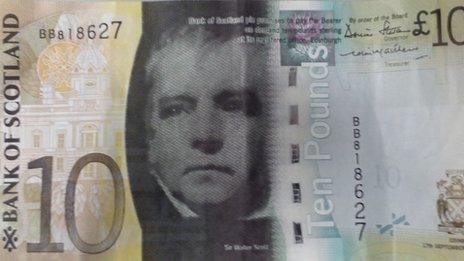Malachi Malagrowther and the Scottish banknote
- Published

Sir Walter Scott appears on Bank of Scotland notes, thanks to his own campaign
But have they reckoned with Malachi Malagrowther? By "they", I refer to the thinkers and tacticians at the Treasury who are suggesting that Scottish banknotes may face extinction in the event of independence.
And Malagrowther? That is the pseudonym adopted by Sir Walter Scott when, in March 1826, he launched a spirited and sustained attack against an earlier effort to interfere with Scotland's paper currency.
Sir Walter features on notes issued by the Bank of Scotland - not just because he was a brilliant writer (though he most certainly was), but because his currency campaign succeeded.
Under his transparent pseudonym (the name Malagrowther is a character in one of his novels), Sir Walter wrote three letters to the Edinburgh Weekly Journal. This swiftly grew into a popular campaign across Scotland.
Scott's target was a proposal to forbid private banks from issuing notes of less than £5. This UK government plan was introduced because some smaller English banks were apparently struggling to redeem the promissory notes. (There was a banking crisis at the time.)
Scott reckoned the plan would be troublesome in Scotland where smaller notes were dominant. He believed it was an unnecessarily uniform response to a distinctively English problem.
Perhaps, though, both sides may be able to cite Sir Walter's intervention in their defence. Nationalists will warm to Scott's view that Scottish interests deserved distinctive treatment.
Unionists may argue that Sir Walter's case succeeded because it was heeded in the House of Commons where Scottish representatives were able to persuade and cajole; evidence, they might say, that Scotland's voice in the UK can be influential.
On the wider issue of the currency, anent which more on Tuesday, there is similarly a dual position. The Treasury says that an independent Scotland using the pound would be in a weak position, dependent upon decisions taken by the Bank of England which, by then, would be an institution in a foreign country.
Nationalists say that, regardless of comments now, it would be very much in the interests of rUK (rest of the UK) to maintain a stable currency zone, including Scotland - not least because Scotland could use the pound unilaterally, without reference to London.